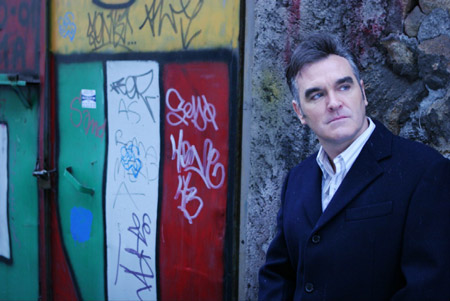-
Morrissey
-
Alternative & Indie
-
Out now
-
EMI
-
Everywhere
Steven Viney

Yes, it’s true. Morrissey is
releasing debut album, Viva Hate, for the third time; and just as with
1997’s first re-release, it’s much to the dismay of lifelong fans who feel that
the content of Morrissey’s initial releases somehow belongs exclusively to
them.
It is also being argued that,
despite the album’s greatness, not much more could be said about the album
itself, or Morrissey, that hasn’t already been said.
But sentiments like these too
quickly dismiss what is really important about re-releases, and that is,
turning new fans on to sounds, records and artists that might otherwise go
unnoticed. And with an album as good as, Viva Hate, that would be
tragic.
Viva Hate was the album with which
Morrissey launched his solo career whilst simultaneously confirming The Smiths
as being over. During the eighties – the golden era of indie rock – Morrissey’s
cunningly romantic lyrics, combined with Johnny Marr’s piercing, arpeggio
guitar riffs changed the scope of popular music forever in a project known as
The Smiths.
As with many great bands
though, internal bitterness between band mates eventually led to their demise.
It was then only cheekily fitting that Morrissey would confirm the split with a
solo album entitled Viva Hate, or, long live hate – which he released in
early 1988; less than six months after The Smiths last studio release.
The album instantly proved to
listeners that Morrissey could succeed without Marr, as his lyrical prowess prevailed;
only slightly scathed by the split. In a nutshell, Morrissey’s lyrics are
intellectual, thought provoking and full of saddened laughter. The songs make
you question your personality, your life, who your friends are, and why you
choose to keep living.
Viva Hate contains several solo
Morrissey hits, including ‘Suedehead’ and ‘Everyday is Like Sunday,’ both of
which portray sadness and inner discontent as something to be glamorised yet
mocked at the same time – in good old Morrissey fashion.
Also on the record are
lesser-known classics such as ‘Break Up the Family,’ which bemoans the
protagonist’s frustrating dilemma: choosing a romantic life of solitude,
independence and adventure, versus a familiar life at home in the comfort of
close family and friends.
Nonetheless, every track of Viva
Hate is worth listening to, to put it lightly, as every song is layered
with immense lyrical depth that one can read into for years and years.
The 2012 re-release stays
true to the initial album artwork and general track listing, however, the song
‘The Ordinary Boys’ has been removed – at Morrissey’s insistence – and replaced
with a new track ‘Treat Me Like A Human Being.’ This came as quite the
disappointment, as ‘The Ordinary Boys’ was one of the best tracks on the
record. However, it appears Morrissey is trying to send out a message with the
newly added track; after a lifetime of self-imposed abstinence from romantic
relationships, he appears to be begging for somebody to love him.
Also, the re-release is
titled Special Edition, though the reason is not clear, since there’s
nothing remarkably ‘special’ about it, except for the fact that they’ve
switched the initial font on the front cover to something more hideous.
Nonetheless, this re-release
gives unbeknownst fans the chance to discover Morrissey and the endless beauty
and genius he reveals; embedded in lyrics that continue to sound as fresh as
they did when they were initially released.
Write your review
recommended
 Shopping
Shopping
Perfectly Wrapped for the Season: 8 Online Egyptian Bag Brands for Christmas Gifting
Alamki Canella +9 Sights & Travel
Sights & Travel



